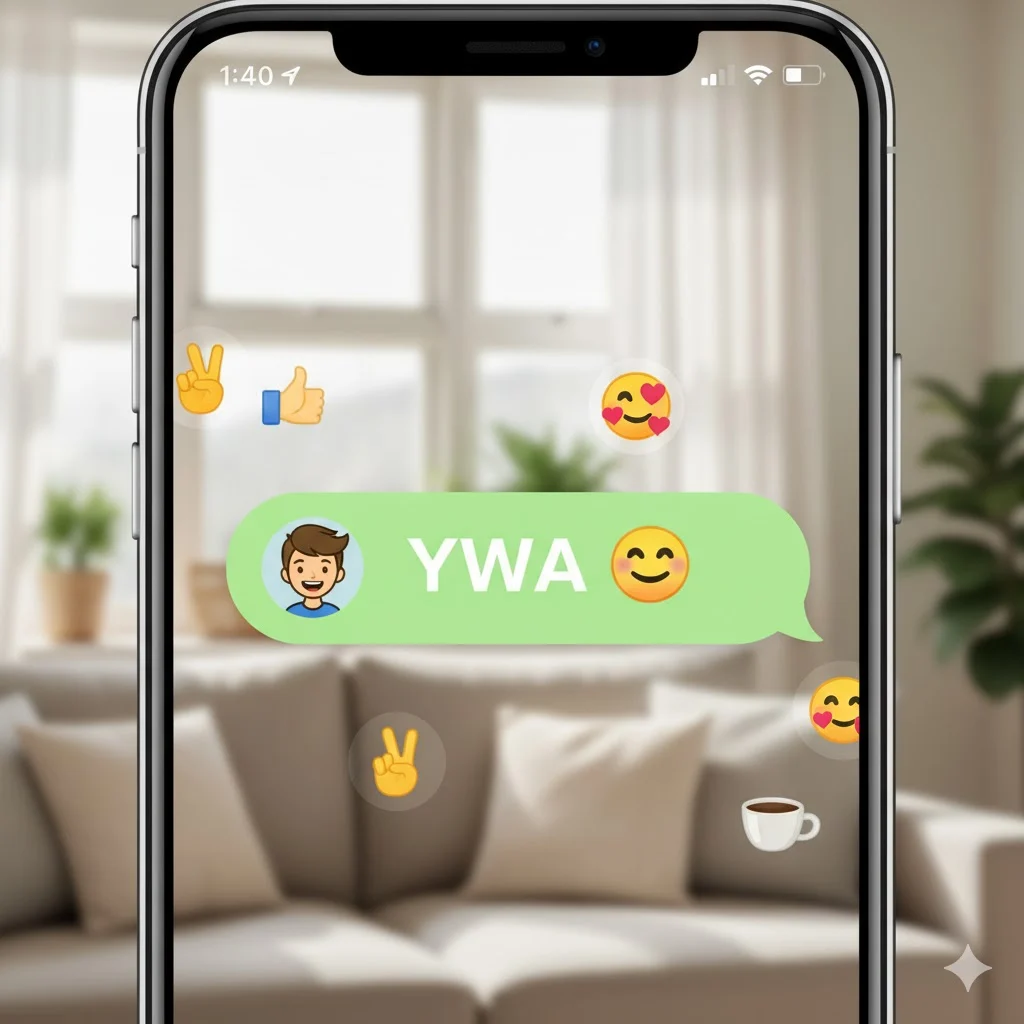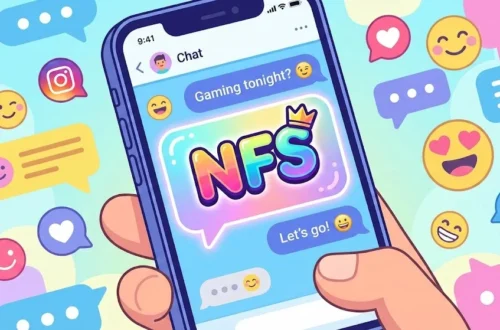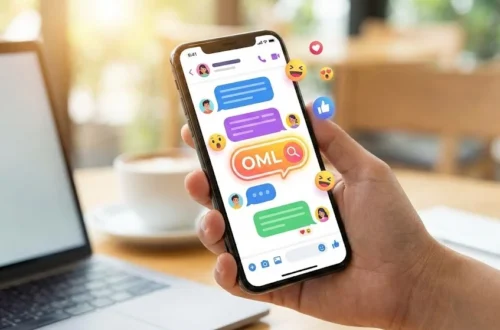Hey there! If you’ve ever been texting, chatting on social media, or gaming and came across “YWA” and paused to think, “What’s that?”, you’re in the right place. Whether you’re trying to stay on top of slang, communicate with friends, or simply not feel left out in a chat — understanding what YWA means can help a lot.
In everyday chats, DMs, comments or casual gaming lobbies, these little acronyms pop up everywhere — and not knowing them can leave you guessing the meaning or tone. That’s why in this article I’m talking directly to you, the user who wants clarity and confidence in modern chat-slang. By the end, you’ll see why understanding YWA is more than just knowing an acronym — it’s about reading tone, knowing context, and responding smoothly.
Definition & Meaning
So, what does YWA mean in text?
It’s used when someone says “thank you” (or acknowledges something) and you reply with YWA to mean something like: “You’re welcome, even though it maybe wasn’t exactly what you wanted or needed.”
Examples in Real Conversations
Here are a few dialogues showing YWA in use:
Friend A: “Thanks for sending me that link, even though I used a different one.”
Friend B: “YWA — no problem!”
You: “Thanks for at least trying to help.”
Friend: “YWA :)”
Gamer1: “Thanks for the assist, even though I still died.”
Gamer2: “YWA, we’ll get it next time!”
In each case, YWA is a reply, a short reaction to someone’s thanks or acknowledgement. It’s not just “you’re welcome” — it adds a nuance of “anyway”, “despite that”, or “even though…”.
So in simple terms:
YWA = You’re Welcome Anyway (used to reply to thanks, sometimes with a hint of “even though it may not have helped exactly”)
Background & History
Where did YWA come from, and how did it evolve?
Origin & Early Use
A lot of modern texting slang comes from the need to reply quickly and with less typing. Acronyms like YW (“You’re Welcome”) have been around for years. Dictionary.com The addition of “A” for “Anyway” gives it a slight shade of meaning beyond just a straightforward “You’re welcome.”
Evolution into YWA
Over time, in chats and social media, people began using YWA as a shorthand reply to “thanks.” It often carried a tone: maybe the help offered wasn’t perfect, maybe the person didn’t fully use it, but you still want to acknowledge them. The “Anyway” signals a kind of friendly tolerance. Sources show that YWA is increasingly used in game chats, Instagram and Snapchat conversations.
Where it’s Common Today
Today, YWA is common in:
- Text messaging among friends
- Social media comments (Instagram, Snapchat)
- Gaming chats
- Casual online threads
It’s less likely to appear in formal writing or professional emails (we’ll cover that later). The history shows that its meaning and tone depend heavily on context — something that evolved through digital culture rather than through formal language rules.
Usage in Various Contexts
Let’s explore how YWA works in different settings — from texting to gaming — with sample dialogues.
1. Texting & Casual Chats
Friend: “Thanks for picking me up even though I was late.”
You: “YWA, didn’t want you stranded.”
In this context, YWA = “You’re welcome anyway, glad I could help even though things were messy.”
2. Social Media & Comments
- Comment under a photo: “Thanks for the feedback!” → “YWA 👍”
- Chat on Snapchat:
User 1: “Thanks for the promo code.”
User 2: “YWA 🙂 hope it helped.”
Here, YWA is light, upbeat.
3. Gaming / Voice Chat
Player A: “Thanks for the revive, even though I screwed up.”
Player B: “YWA — we got this next round.”
In gaming, YWA can mean “Glad to help, even though we’re still losing” — friendly support.
4. Casual Spoken Conversation
While more common in text, YWA could be used verbally (especially among younger people comfortable with chat-slang):
“Thanks for coming out.”
“YWA, nice to hang.”
The tone is friendly, informal.
Common Misconceptions & Clarifications
Because YWA is less formal, there are misunderstandings. Let’s clear them up.
❌ Misconception: YWA always means “You Were Awesome”
Some communities might use YWA to mean “You Were Awesome,” especially in gaming. But the most commonly accepted meaning is “You’re Welcome Anyway.”
❌ Misconception: YWA is always sarcastic or rude
Not always. Yes, YWA can come off as curt or passive-aggressive (for example: “YWA.” with no emoji and abrupt tone), but in many cases it’s simply a friendly acknowledgement. Context and tone decide.
❌ Misconception: It’s a formal alternative to “You’re welcome”
No — it’s informal. It’s meant for chats, not for formal or professional replies.
✅ Clarification: Tone & context matter
The tone of your text, emoji usage, relationship with the recipient, and setting all affect how YWA is received.
- With a smiley or friendly emoji ⇒ warm, friendly acknowledgement
- Without emoji or with a blunt tone ⇒ possible indifference or mild frustration
Similar Terms & Alternatives
Here are some related phrases and how they compare to YWA:
| Term / Slang | Meaning | Best Used When |
|---|---|---|
| YW | “You’re welcome” | Basic reply, very neutral |
| No problem / NP | “No problem” | Casual and friendly |
| Thanks / TY | “Thank you” (reverse role) | When you want to thank someone |
| YWA | “You’re welcome anyway” | You want to acknowledge but add nuance |
| Cool / Got you | “Okay, you’re covered” | Very casual, informal |
You can pick a phrase based on how formal or casual you want to be, and how big the interaction was.
How to Respond to This Term
If someone uses YWA toward you, how should you reply? Here are different styles:
Casual / Friendly
Other person: “YWA, thanks for the help!”
You: “Anytime! 😊”
Funny / Playful
Other person: “YWA … but you still owe me coffee 😂”
You: “Deal — coffee is on me!”
Clarifying / Neutral
Other person: “YWA.”
You: “Got it — thanks anyway.”
Professional / Polite (avoid YWA yourself)
If someone writes “YWA” in a semi-formal chat:
“Thank you for your effort. I appreciate it.”
Or you might avoid using “YWA” yourself altogether and use a full phrase:
“You’re welcome — glad I could help.”
Privacy-Conscious / Safe
If you’re not sure how your tone will be read:
“You’re welcome. Let me know if you need anything else.”
Regional or Cultural Differences
YWA is mostly used in English-speaking or bilingual internet-contexts. It’s less regionally specific than some full slang terms that originate in one country or language. However:
- In the U.S. and U.K. it’s understood among younger social-media users.
- In non-English speaking countries, it may not be widely known — someone might read it as unfamiliar or ambiguous.
- Because it’s informal and digital-centric, older generations or formal settings may not recognize it.
So, if you’re texting someone from a different culture or generation, it might be safer to use full phrases like “You’re welcome” rather than YWA.
Comparison with Similar Terms
Here’s a quick comparison:
| Expression | Meaning | Intensity | Formality |
|---|---|---|---|
| YW | You’re welcome | Medium | Very informal |
| YWA | You’re welcome anyway | Medium, with nuance | Informal |
| NP / No problem | No problem / you’re fine | Low-Medium | Casual |
| You’re welcome (full phrase) | You’re welcome | Neutral | Neutral–Formal |
YWA sits between just “YW” and a full polite phrase — it adds a nuance of “even though…” or “regardless,” which gives it its unique flavor.
Usage in Online Communities & Dating Apps
In places like Instagram, gaming chats, Snapchat, Tinder or Twitter, YWA shows up frequently.
- On Twitter / X: Someone might reply to a thank-you with simply “YWA 👍”
- On Tinder / Dating app: Match: “Thanks for the pick-up message.”
You: “YWA 😉 what’s your favourite movie?” - In gaming chat: Player1: “Thanks for covering me while I respawned.”
Player2: “YWA, got your back.”
Tips:
- Use YWA when the vibe is casual and friendly.
- Pair with an emoji to soften or clarify tone (😊, 🙂, 👍).
- If you’re unsure how the other person will read it, use a clearer phrase instead.
Hidden or Offensive Meanings
YWA is generally not offensive — it’s a polite or semi-polite reply. But there are caveats:
- Because “Anyway” can carry a subtle “despite” or “even though” meaning, if used curtly, YWA could feel dismissive.
- In a conversation where the person thanked you for something meaningful, a terse “YWA” (no emoji, no warmth) might seem cold.
- Tone matters a lot. For instance: “YWA.” (period, no smile) might signal “Yeah, whatever.”
So always consider your relationship with the person, the tone of the prior message, and whether a longer phrase might be kinder.
Suitability for Professional Communication
In professional settings or formal writing, YWA is best avoided. Why?
- It’s slang and informal.
- It may not be understood by all recipients.
- It may come off as too casual or even slightly dismissive.
Professional alternatives you can use:
- “You’re welcome.”
- “You’re welcome — happy to assist.”
- “My pleasure.”
- “Glad I could help.”
If someone sends you “YWA” in a work chat, you might ignore the acronym and respond with something like:
“Thank you — glad we could get that sorted.”
FAQs
1. What does YWA stand for?
Most often: “You’re Welcome Anyway.”
2. Is YWA the same as YW?
No — YW means “You’re Welcome”; YWA adds “Anyway,” which gives an extra layer of meaning.
3. Can YWA mean something else?
Yes, in rare contexts people might use it differently (for example “You Were Awesome”), but the common meaning is “You’re Welcome Anyway.”
4. Is YWA rude?
Not inherently. With the right tone and emoji it’s friendly. But used curtly it can feel dismissive.
5. Can I use YWA in a professional email?
It’s not advisable. Better to use full, polite phrases.
6. Does tone matter?
Absolutely. The presence of an emoji, the punctuation, the relationship — all change how YWA is received.
7. Is YWA widely understood?
It’s common among younger social-media and texting users. But it might confuse people unfamiliar with digital slang or from different cultural backgrounds.
Conclusion
In summary: YWA is shorthand for “You’re Welcome Anyway.” It’s a friendly, informal way to reply when someone thanks you — especially if the help you gave wasn’t perfect or they used another solution. It works great in texting, social media, and gaming chats — as long as you get the tone right.
If you’re chatting casually with friends, feel free to drop it in. Just remember: in more formal or unfamiliar situations, opt for a full phrase like “You’re welcome — happy to help.” Tone and context make all the difference in how your reply is received.






